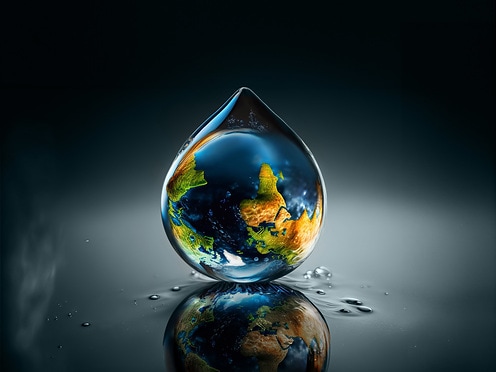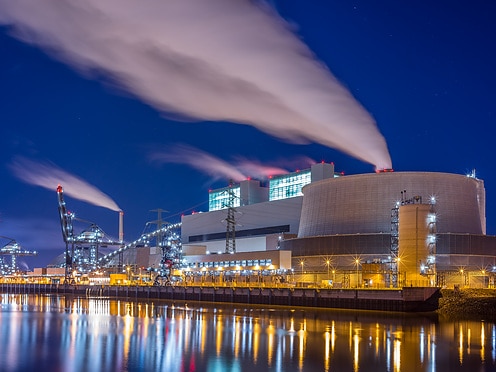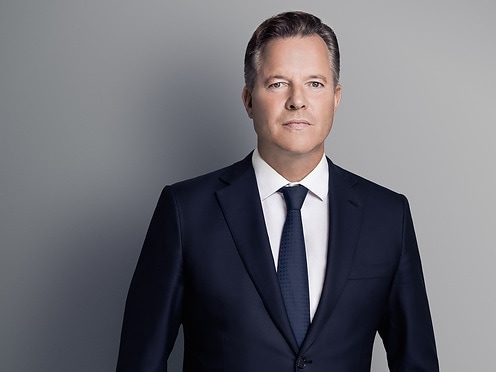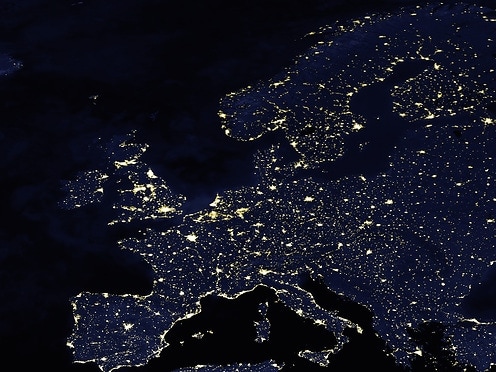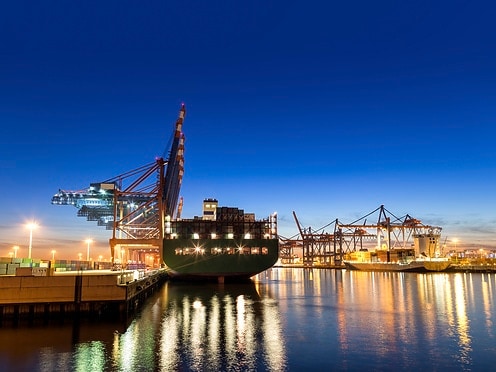Thinking Europe in solidarity - Leading the industry confidently into the future
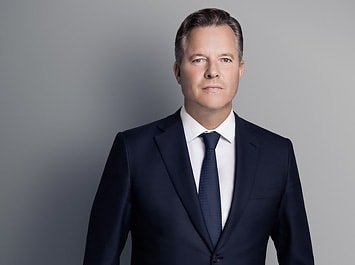
Oliver Hermes is President & CEO of the Wilo Group, Chairman of the Board of Trustees of the Wilo-Foundation, member of the Board of Trustees of the Family Business Foundation and member of the Executive Committee of the Near and Middle East Association (NUMOV). He is an essayist with articles published in independent media. The opinions expressed are those of the author only.
Even today, we remain fascinated by the “Old 1920s” in Europe – and especially by the years after 1924. In Germany, thinking about this period brings to mind a time of artistic flowering, of excitement, and of wild nightlife – especially in Berlin! We often use the term “the Golden Twenties” in Germany. Similar terminology is found in English-speaking areas with the “Roaring Twenties”. The Italians have the “Anni ruggenti”, and the French speak of the “Années folles”, which loosely translates as the “Crazy Years”.

The “New 20s” have also started off in quite a “crazy” and spectacular fashion in their first year. It’s not just artists who have to stay at home. In a time of social distancing and partial private isolation, the idea of coming together and enjoying a night out is completely out of the question. The corona pandemic is making Europe tremble and our continent is facing a test of historic proportions. An unbelievable number of people in Europe are losing their lives and are threatened with loss of jobs and prosperity.
There is no doubt that European solidarity in health and increasingly also in economic matters is facing a litmus test as a result of the corona crisis. However, the question of solidarity and sovereignty within our community of states does not only arise today in times of crisis. The question of a coherent European industrial strategy has also been insufficiently answered for too long within the EU. This is where the opportunity lies in the crisis and Europe's hour may yet strike. First a chronology of events:
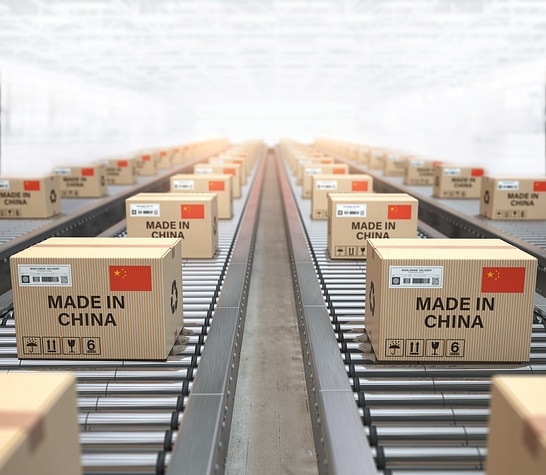
European industry before the outbreak of the corona pandemic
Individual countries outside Europe adopted national industrial strategies shortly before the outbreak of the pandemic and are implementing them consistently:
The USA is dominated by the “America First” approach: essentially, the US government is concerned with strengthening national companies in a variety of sectors and undertaking a re?industrialisation of the country.
The Chinese government has a clear plan for promoting its own industrial landscape. To this end, it has formulated its “Made in China 2025” strategy and is in the midst of implementing it. The Chinese industrial strategy has identified ten sectors within which it aims to nurture Chinese companies into global champions.
Russia, too, has formulated a clear industrial strategy, not least because of sanctions imposed years ago that remain in force. The country’s objective is to reduce its dependency on the raw material markets – those for oil and gas in particular. In addition to strengthening export activities, it aims to diversify its industry and increase local value creation.
The countries of the Middle East have developed national visions, which also contain clear goals for strengthening industrial activities. The aim of all these national plans is to reduce dependency on oil and gas and to prepare for the “New 2020s”. As with China's industrial strategy, Saudi Arabia, the United Arab Emirates, Oman, Kuwait and Qatar have all set clear climate protection goals and targets for the digital transformation.
But if we take a look at our own continent before the corona crisis and try to find a coherent industrial strategy for the EU, we’ll be left bitterly disappointed. Even before the outbreak of the pandemic, the EU was already too preoccupied with itself, with Brexit and the burgeoning national populism in some southern and central European countries. From this position of weakness, at best the EU was perceived, even before the corona crisis, as a junior partner of the USA in security and defence matters and as a junior partner of China in economic matters.
In Europe, even before the outbreak of the pandemic, we had to make sure that the new decade would not be characterised by bipolarity and that the rules of the game would not be determined by the USA and China alone, especially in the digital industrial age.

Europe's industry is crucial in tackling the corona crisis
In times of crisis, some economic experts are already singing the praises of European industry and the “old economy”. Reference is made to the rise of technology giants like Amazon, Apple, the big streaming companies, Microsoft with its cloud services and certainly the gaming giants like Nintendo. Supposedly, all these digital companies benefit from the coronavirus crisis and their business models are boosted as if by magic. On the other side, the “shutdowns” of the traditional European industrial companies and a corresponding fall in share prices on the stock markets are illustrated negatively.
It is certainly true that in the midst of the coronavirus crisis we are discovering the digital world of streaming, e-sports and e-learning, and we are using e-commerce and online shopping much more than before. But it is also true that the crisis demonstrates that people in Europe cannot exist without industrial products, most of which are also produced here.

Medical equipment such as respiratory devices and laboratory equipment industrially produced in Europe is needed for survival. It is the industrial products that ensure the maintenance of critical European infrastructures in the health, energy & water, transport and traffic sectors. Even goods sold online must first be industrially produced and physically available in order to be distributed virtually in Europe. Even the commodity ‘toilet paper’, which is rare and sought-after these days, is an industrial (luxury) product.
So, I think it is once again wrong to proclaim the sunset of industrial societies in Europe. The crisis shows that European industrial and technology groups make an essential contribution to keeping systemically important sectors running and are thus a fundamental component of critical infrastructure in the EU. Therefore, industrial companies are also the ones ensuring the survival of our fellow citizens in times of crisis.
At the political level in many countries of the world, the initial reactions to the coronavirus crisis came as a reflex and were mostly nationalistic. We witnessed unilateral border closures not only within the EU, medical supplies and protective materials were hoarded, and a systematic redistribution of patients between countries was initially unthinkable.
In recent weeks, the heads of state and government across Europe have met in various EU bodies using videoconferencing systems. It is slowly becoming clear that the virus knows no borders and that a considerable degree of coordination and supranational solidarity in Europe is needed to contain the pandemic.
As much as isolation in private life and social distancing currently characterise the social environment in the member states, the opposite is true at the political level. It is now essential for Europe to come together and cooperate and coordinate.
In parallel to mastering the health crisis, it is extremely important to minimise the economic damage caused worldwide, to preserve financial stability and to prepare for a subsequent economic recovery phase, especially in the industrial segment, even now in the midst of the corona crisis, carefully and above all courageously, in a long-term and crucially future-oriented manner.
By acting in unity and solidarity during the crisis, the foundations should be laid for a future sovereign Europe with a strong industry in the digital age.
What was missed in the past and in the pre-corona era could now be made up for with a new injection of energy. In times of crisis, entrepreneurs always look for opportunities. The same should apply to European policy.

The Future of European Industry “Beyond the Obvious”
In their videoconferences, the heads of government of Europe have so far decided what is “necessary” to overcome the corona crisis. Decisions have been taken regarding emergency aid through the European Stability Mechanism (ESM), the creation of the EU short-time employment scheme (SURE), and support for companies through the European Investment Bank (EIB).
This is certainly an important and correct step. The measures adopted will also benefit European industrial companies, with their approximately 30 million employees and their families, as the backbone of the European economy. But the measures do not go far enough. They represent only one minor step. They are obvious and provide only one answer to what is self-evident, namely the acute and short-term management of the economic and social impact of the crisis. So far they have lacked a long-term vision.
But now is the right time to think beyond the obvious and not only lead the continent out of the crisis with appropriate means, but also make it fit for the future and make up for past failures.
The task now is to lead Europe not only out of the corona crisis but into a new age. In particular, it is important to create such framework conditions which will enable European industrial companies to remain globally competitive in the digital age.

An overall geostrategy for the European Union is imperative
In post-crisis times, in the “New 2020s”, the EU must be proactive in order to become an equal partner on the world stage and not simply a “follower” of the USA and China. We need to get ourselves ready now by thinking more broadly about the scope of measures necessary for dealing with the corona crisis.
The EU must become more self-confident and, above all, more sovereign in the new decade as part of what one hopes will be a successful crisis management based on solidarity.
Before the outbreak of the pandemic: Nowhere else in the world was the life expectancy so high and did people live as comfortably, as healthily, as peacefully and with such a great level of wealth. There was no other region in the world where prosperity was as widespread as in Europe. European countries occupied the top seven entries in the World Happiness Report 2019, which examines the quality of life of individual countries.

It is therefore worthwhile to fight resolutely together to ensure that these benefits continue to be available to Europe's citizens in the future.
To this end, it should first be noted that the formulation of an EU geostrategy is essential and represents the “mother” of all downstream strategies, such as a coherent industrial strategy.
In order to position European strengths much better globally in the future, it is therefore urgently necessary to develop further sectoral or functional strategies based on an EU geostrategy. These include a Europe-wide security strategy, but also an energy, climate protection and digitisation strategy with all the interdependencies with regard to a newly defined European industrial strategy.
Especially after Brexit, the EU must send a strong signal that geostrategically European integration will continue. Within the framework of the formulation of a geostrategy, the enlargement of the EU to include, for example, countries in the Western Balkans should therefore be declared a top priority. The countries of the region are an integral part of Europe and should be further integrated into its political and economic structures as soon as possible. European industry would benefit from this, as these countries are of growing interest as sales and procurement markets.
We should welcome the fact that the EU has now developed new strategic elements for relations with Central Asia and for improved connectivity with the Eastern partner countries. However, as long as the strategies are not linked to a dialogue with the Eurasian Economic Union (EMU), their chances of success are limited. In the interest of European industry, we really need an institutionalised exchange between the two commissions of the EU and the EAWU.
There is huge economic potential here, which is not being fully exploited at present, as a clear geostrategy and the clarification of the Russia question are missing. On their own, neither the EU nor Russia will manage to develop an effective antidote to the division of the world by the Chinese and the Americans. Once the EU geostrategy is in place, there should be a serious exchange about a common economic and industrial area from Vladivostok to Lisbon.
In any case, it is clear that it is not enough to focus solely on the issues surrounding pandemic control and then again on climate protection.
Trust in the European markets must not be lost. This danger exists, however, if the measures taken so far focus only on “rescue” or “reconstruction” and not also on a strategic orientation of Europe going forward.
'Rescue and reconstruction are self-evident and necessary, they are obvious. The geostrategic future orientation of Europe, however, goes beyond the obvious.'
The European “reconstruction fund” must be a “future fund”
This must also be taken into account in the design of an EU reconstruction fund born out of the corona crisis. It must be a future fund. A pure “reconstruction fund” would not be sufficient.
Of course, the first step should be to determine the purpose and the use of the funds to support the European economy and, in particular, member states hit particularly hard by the pandemic.
The supply chains within Europe are more closely interlinked than in any other economic integration area in the world. Some economic experts speak of a single value chain within the European Union. It is therefore self-evident and obvious to stabilise Europe's value chain so that individual member states do not fail as either customers or suppliers.
But under no circumstances must it be left at that. The future direction of the European economy and its crucial industrial enterprises cannot be ignored. Once again, one must think about the obvious and beyond.

Focus on digital transformation and climate change
In addition to “rescuing” companies, the fund should therefore focus on future issues such as digital transformation and climate change and compensate for Europe's backlog in research, development and education.
That is why I think the term “reconstruction fund” or “recovery fund” is rather reactive and does not represent what is needed. A prospective term like “European Go-Ahead Fund” would be much better.
In the context of the digital transformation, European industry should not only focus on creating smart products, systems and solutions and building digital production facilities. That would again be too short and obvious.
The digitisation of sales and marketing processes, including distribution processes, must be pushed in a proactive and future-oriented manner with urgency and speed. It is important to retain important customers and gain new ones.

The corona crisis shows quite clearly that, on the contrary, there is now an opportunity to increase customer retention and loyalty of European industrial customers through digitisation.
In this respect, the USA and Asia have so far been somewhat ahead of us. They look at the digital transformation from the “front end” i.e. from the customer's point of view. In Europe, it is often conceived and structured under the label “Industry 4.0” or “Industrie du Futur” from the “back end”, i.e. from procurement and production processes.
This needs to be changed and will require European industrial companies to go beyond all measures and beyond the obvious.
In this respect, a fund for the European economy and its industry should support the innovative strength of companies so that they are able to continue strategic research and development projects despite corona-related economic downturns and accelerate the digital transformation in all functional areas.

Climate protection will remain a critical topic of our time
As we know from the pre-corona crisis period, long-term developments have a significant effect on climate and will therefore rightly remain one of the top issues of our time at all levels of society in the future, too. This will continue to be the case for future generations even after the pandemic has been overcome.
The new President of the European Commission, Ursula von der Leyen, used her election address to the European Parliament to announce that Europe would become the planet’s first climate-neutral continent by 2050. This is a worthy objective in theory at least.
After all, the climate needs trailblazers and pioneers. Someone has to show courage and lead the way, and Europe can take on this role. A future-oriented fund born out of the corona crisis should include the goal of achieving swift climate neutrality.
In terms of climate protection, there is a convergence of objectives consisting of saving future?oriented industrial companies on the one hand and saving the climate on the other.

A large number of European industrial companies have already developed a clear and stringent sustainability strategy. The core of a large number of these corporate strategies is to supply more people with climate-protecting products, technologies and services while reducing the ecological footprint. From a global perspective, European industrial companies can thus make a substantial contribution to climate protection through energy and resource efficiency.
Many European industrial companies are climate protection companies. Climate protection is part of their business models. Our work with the precious resources of water and energy, as well as our approach to protecting the environment, requires a sustainable mindset and actions. This is firmly anchored in the corporate culture of many European industrial companies.
A future-oriented fund to cope with the pandemic should not only save these climate-protection?oriented companies, but also give them the opportunity to position themselves on the global markets in the long term.
By the way, it should be noted that those products, systems and solutions that protect the climate are usually also those with the highest digital intelligence.
The aim of a European future fund should therefore be to combine and coordinate the components “climate protection” and “digital transformation”.
Value creation within Europe must be increased
Another important objective of a European future fund should be not only to increase the global distribution of value added in favour of the European member states, but also to intensify the respective level of value creation of companies within Europe.
The Central and Eastern European countries, which are already closely integrated into the value chains of European companies, could benefit from the current considerations of regionalising supply chains and concentrating strategically important production processes in Europe.
The corona crisis has shown that a sovereign Europe also includes precisely those industrial companies that are systemically relevant and at the same time serve critical European infrastructures in the health, energy & water, transport and traffic sectors.
As a result of the corona crisis, many European industrial companies will revise their make-or-buy strategies and, if in doubt, seek to produce critical components for the manufacture of industrial goods in Europe themselves, in favour of risk minimisation and at the expense of return requirements. This requires additional capacities and corresponding investments.
Here, too, the EU should create appropriate investment incentives via a future fund. The aim is to bring the value added back to Europe and at the same time expand the level of value creation.

Issuing Eurobonds is a logical consequence
Once the geostrategy of the European Union has been outlined and defined, the goals and purpose as well as the use of funds of a future-oriented European “Go-Ahead-Fund” will be determined; then and only then will the question of financing arise.
Coping with the consequences of the corona pandemic coupled with a necessary future orientation of Europe, while at the same time making up for past failures, represents a Herculean task for the EU member states.
This Herculean task must of course be financed. Here, too, one must think beyond the obvious. Issuing Eurobonds should therefore no longer be a taboo subject, especially for the more prosperous economies within the EU.

We must all recognise the challenges that will determine the future of our continent and in this respect assume responsibility for future generations. Conversely, this means that the wealthy countries of Northern Europe must also assume joint liability for weaker or even distressed member states. Joint problems and crises require joint solutions.
However, joint financing is also necessary as a logical consequence if we want to guarantee a common future and determine measures and fund allocation for this purpose by mutual agreement.
Many Northern European countries are comparatively prosperous and economically strong. On the one hand, they derive their economic strength in no small part due to their exports of finished products to EU member states, some of which are not as economically prosperous. On the other hand, in some cases they are heavily dependent on supplier products from the economically weaker countries.
So if the less prosperous and less economically potent European countries fall into economic difficulties, then these countries will potentially fail as customers and also as suppliers, and a substantial number of jobs will be at risk even in the EU countries blessed with export surpluses. Nevertheless, the European Union is not worthy of its name if it manages crises with a primarily national focus and the member states do not stick together and stand in solidarity with each other.
It cannot be described as a union of any sort if it does not try to meet future challenges together. This applies in particular to the resulting financial dimension of the endowment of an essential future?oriented European fund. Therefore, the common future of Europe must also be jointly financed.
The states of the European Union are a community of destiny. Joint liability is nothing new in the real economy, because value chains are more or less standardised and highly integrative. If the real economy is in distress in individual member states as a result of a crisis, as is now the case with the corona pandemic, this will quickly affect the very closely-integrated financial economy in individual EU states have an impact on the continent as a whole. The financial crisis of 2008/2009 has shown that this mechanism can only be solved jointly within the EU. Joint liability, both final and financial, therefore already exists. Financial joint liability is also nothing new within the EU.
In Northern European countries, there is often a fear that the introduction of Eurobonds would burden their respective national budgets with higher interest rates due to poorer ratings.
In order to prevent this, it is important to convince investors through the issuance of Eurobonds that the EU's strategy is correct and forward-looking, that it generates growth and ultimately results in a reduction in the debt of member states. This would also allow a potentially risk-induced rise in interest rates to be kept in check.
'The credibility of the EU is crucial.'
It has to document that it is crisis-proof and at the same time supports not only robust but also future?oriented business models that create competitive advantages. The establishment of a future fund is an effective means of achieving this.
Financing by issuing Eurobonds is a logical consequence. Under no circumstances should they be called “corona bonds”, rather they should have a more positive and promising name. In the style of a “European Go-Ahead Fund”, they could also be issued under the name “European Go-Ahead Bonds”.
Strategic premises should reflect conditionality
In microeconomics, when issuing corporate bonds, the financial investors at the level of the issuing companies require compliance with financial covenants, i.e. financial ratios, in most cases.
Economic experts often also demand financial conditionality for the issuance of Eurobonds as common bonds. This is self-evident and obvious.
Jens Weidmann, President of the German Bundesbank, for example, drew a metaphorical comparison in the private environment of the fellow citizens of Europe by postulating that one does not hand over one's private credit card to other people whose spending behaviour one cannot control. However, this does not take into account the fact that married couples often have a so?called twin card or that partner cards are also issued to trusted persons.

The most important thing is therefore confidence within the European Union.
Looking beyond the obvious, it is much more important to set strategic premises than conditionality when issuing Eurobonds. Strategic covenants should therefore be imposed.
Only if the member states of the EU strategically succeed in identifying and realising growth prospects will national debt decline. Sustainable growth is therefore the order of the day for the respective EU economies once the corona pandemic is over.
The bottom line is: If we formulate a geostrategy in parallel to overcoming the crisis within the EU, develop downstream sectoral or functional strategies, establish a European future fund and finance it jointly and solidly, we will strengthen the European economy and, as the backbone, its industrial companies.
Corporate political responsibility is now a key factor
We have a duty to lead not only European industry, but with it the economies and their fellow citizens as a whole towards a prosperous future. Towards a sovereign Europe.
Industrial companies are called upon to take political responsibility for our continent of Europe. In addition to the classic three “P” goals “People, Planet, Profit”, it is essential to integrate “Political Responsibility” as the fourth dimension in the implementation of corporate strategies.
Yours
Oliver Hermes





